Statistics
- N Scale Model Railroad, 6½' × 3'
- Benchwork: Cookie-cutter built on 1x3 clear pine framework
with ½" homosote on top of ¼" plywood
sub-roadbed
- Woodland Scenics foam roadbed glued to sub-roadbed using latex
Liquid Nails
- Atlas code 55 flex track and turnouts glued to roadbed using latex
Liquid Nails
- Atlas code 55 #7 turnouts on mainline, #5 elsewhere
- 2% max grade
- 1½" vertical clearance at track crossing (railhead to
bottom of bridge)
- Approximately 60' of track (about 1.8 scale miles)
- Hardshell scenery using plaster cloth over wadded-up newspaper,
covered with Sculptamold.
|
Materials, etc.
Track
- Rails and ties airbrushed with mixture of 75% Floquil Rail Brown
and 25% Floquil Weathered Black
- Mainline ballasted with Woodland Scenics Fine Gray Ballast
- Spurs and sidings ballasted with Woodland Scenics Fine Cinders
Scenery
- Traditional hardshell scenery using plaster cloth over wadded up
newspaper, covered with Sculptamold.
- Base layer of Sculptamold colored by mixing it with one of the
basic earth colors listed below. Dilute the basic earth color with 2
parts water, then mix with equal parts Sculptamold.
- "Basic earth color":
- ACE Hardware "Popcorn Kernel" (C13-6) flat interior.
- ACE Hardware "Earth Tone" (C19-6) flat interior.
- 50/50 mix of above two paints.
Structures
- Walther's Interstate Fuel And Oil
- Walther's Clarkesville Depot
- Walther's Glacier Gravel
- Walther's Merchant's Row II
|
Problem Areas
- Slight left/right twist of track at bridges - the U25B wobbles
over the twist and sometimes stalls when one set of wheels leaves the
rail. It derails when run clockwise because of this twist. Once I
recognized the twist as the cause of the derailment, it was easily
remedied with a small shim placed under the low side of the bridge.
- Switching to metal wheel sets on my rolling stock has yielded a
cool sound as trains run, the cars roll a lot smoother, and they
promise to keep the rails cleaner. HOWEVER, "level benchwork" isn't
really in my vocabulary yet! Especially since the FRL is on casters
on top of a carpet! Very slight disturbances cause cars in sidings to
start rolling towards the mainline - just turning my ceiling fan on
can cause all sorts of havoc! But I've found I can embed some Radio
Shack rare earth magnets under the tracks at the ends of the sidings
and these attract the coupler trip pins and metal wheelsets, thus
holding the cars in place!
|
Notes For Next Time
- Point-to-point (with option for continuous running) or loop-to-loop.
- A way to reverse trains.
- Wye - tail long enough for passenger train?
- Reverse loop (mostly hidden track - may be part of staging)
- Turntable (how applicable without steam equipment?)
- Broader curves for passenger service (unless hidden track - but
will I install diaphragms?)
- Watch track left/right twist at bridges!
- I wonder if the softness of the foam roadbed is contributing to
the track twisting? May be use cork next time.
|
References
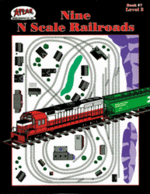
|
Nine N Scale Railroads
Atlas Railroad Co., Inc.
|
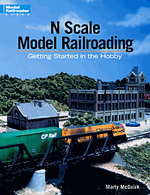
|
N Scale Model Railroading - Getting Started in the Hobby
by Marty McGuirk, Kalmbach Books.
|
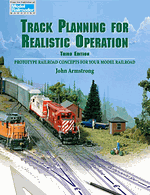
|
Track Planning for Realistic Operation
by John Armstrong, Kalmbach Books.
|
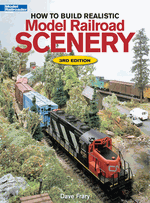
|
How To Biuld Realistic Model Railroad Scenerey
by Dave Frary, Kalmbach Books.
|
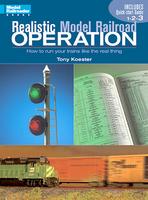
|
Realistic Model Railroad Operation
by Tony Koester, Kalmbach Books.
|
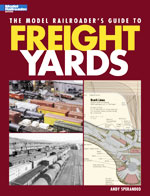
|
The Model Railroader's Guide To Freight Yards
by Andy Sperandeo, Kalmbach Books.
|
|







